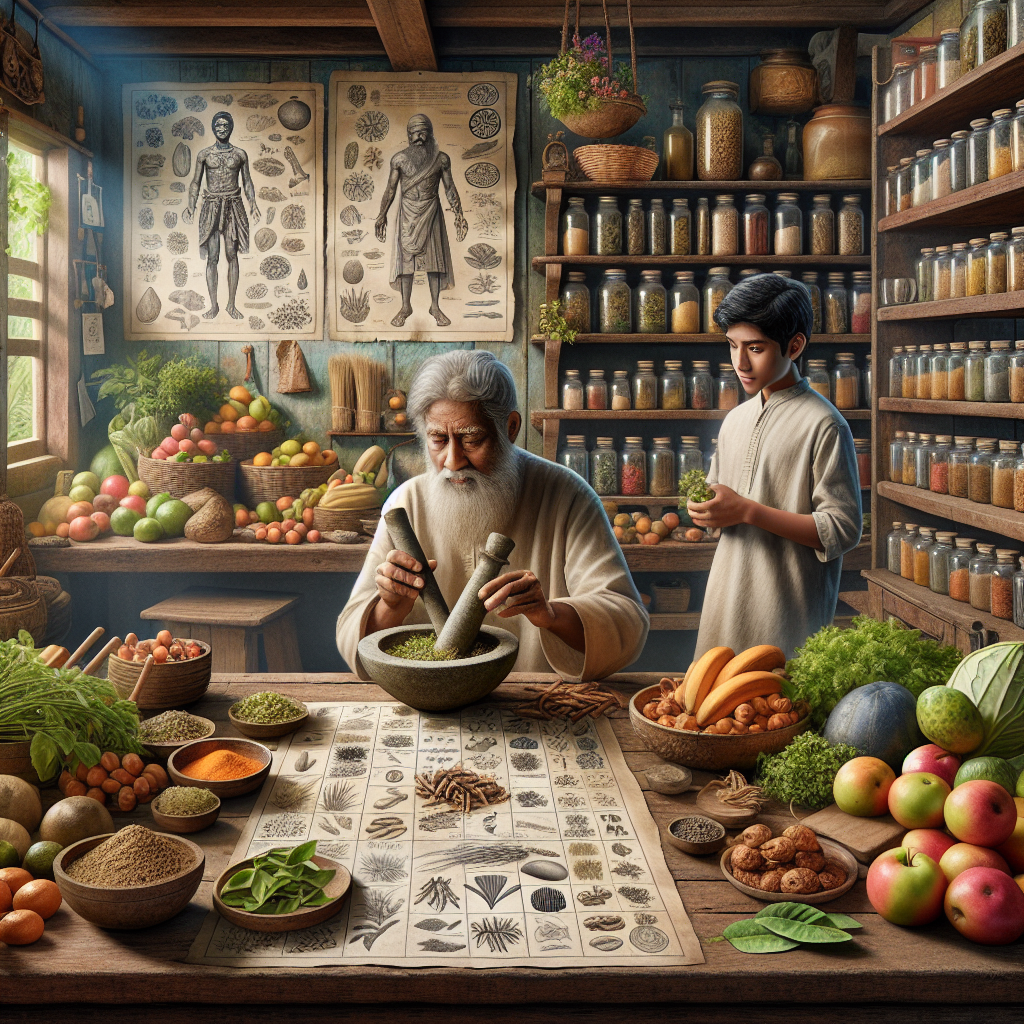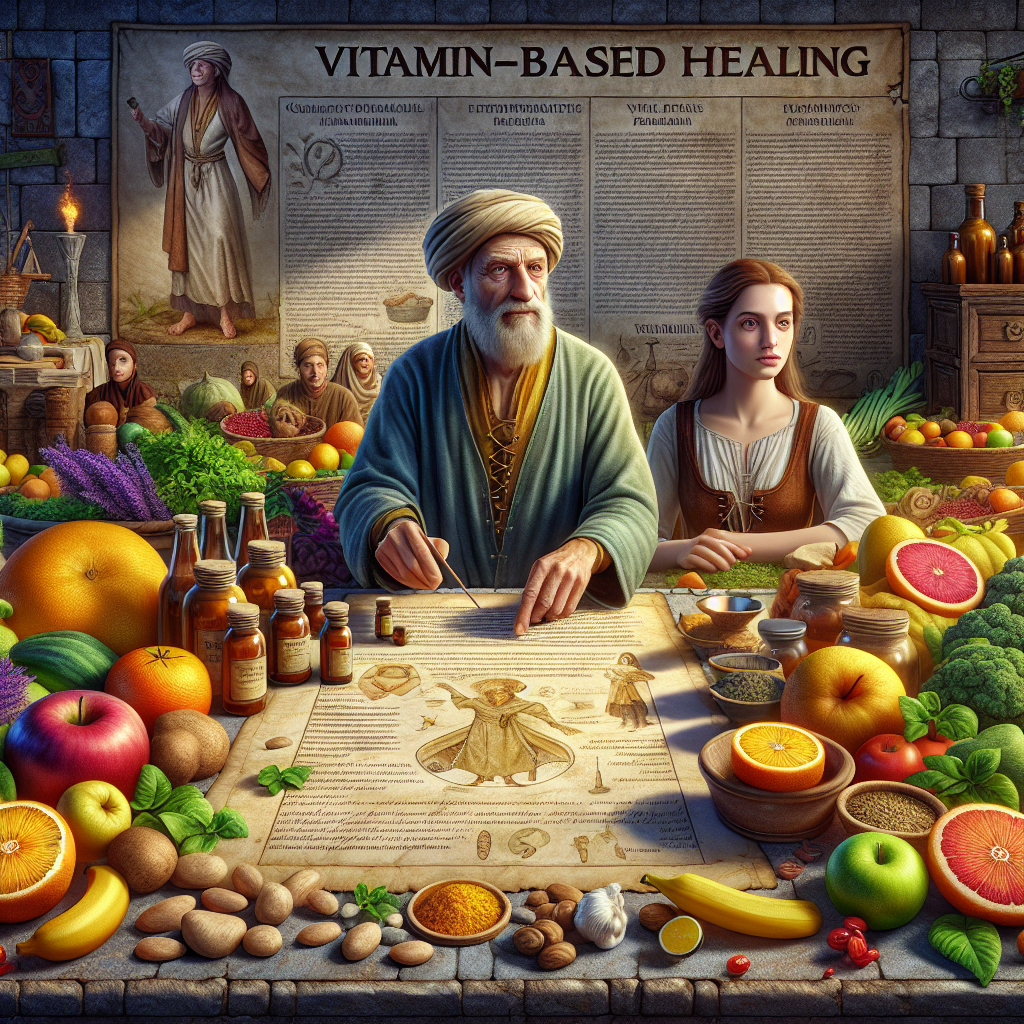Ancient Practices in Vitamin-Based Healing

Discover the secrets of ancient practices in vitamin-based healing! Uncover the wisdom of our ancestors and learn how to incorporate these time-tested methods into your modern lifestyle for optimal health. Visit My Vibrant Vitality now!
Exploring the Role of Vitamins in Ancient Healing Techniques
The ancient world was a treasure trove of knowledge and wisdom, particularly in the realm of health and wellness. Long before the advent of modern medicine, our ancestors had a profound understanding of the human body and the natural remedies that could promote healing and well-being. One such area of ancient wisdom that continues to intrigue researchers and health enthusiasts alike is the role of vitamins in ancient healing techniques.
Vitamins, as we understand them today, are organic compounds that our bodies need in small quantities for normal growth and development. While the concept of vitamins as we know it did not exist in ancient times, the ancients had an intuitive understanding of the importance of certain foods and substances that we now know are rich in essential vitamins.
The ancient Egyptians, for instance, recognized the healing properties of liver, a food rich in vitamin A. They used it to treat night blindness, a condition we now know is caused by vitamin A deficiency. Similarly, the Greeks and Romans understood the importance of a balanced diet and the role of certain foods in promoting health and warding off disease. They consumed a diet rich in fruits, vegetables, whole grains, and lean proteins, all of which are excellent sources of various vitamins.
In the East, traditional Chinese medicine and Ayurveda, the ancient Indian system of medicine, also recognized the importance of a balanced diet for health and wellness. These systems emphasized the consumption of a variety of foods, each believed to have unique properties and benefits. Many of these foods are now known to be rich in vitamins and other essential nutrients. For instance, Ayurveda recommends the consumption of Amla or Indian gooseberry, a fruit rich in vitamin C, for its immune-boosting properties.
The ancient Mayans, Aztecs, and Incas also had a deep understanding of the healing properties of certain foods. They consumed a diet rich in maize, beans, squash, chili peppers, and other foods native to the Americas. These foods are rich in various vitamins and other essential nutrients, and the ancients recognized their importance in promoting health and preventing disease.
In addition to dietary sources, the ancients also recognized the importance of sunlight in promoting health and well-being. The ancient Greeks, Romans, and Egyptians all recognized the healing power of the sun, and sunbathing was a common practice in these cultures. We now know that sunlight is a key source of vitamin D, which plays a crucial role in bone health, immune function, and overall well-being.
In conclusion, while the ancients may not have understood vitamins in the way we do today, they had a profound understanding of the importance of a balanced diet and the healing properties of certain foods. They recognized the role of these foods in promoting health and warding off disease, and their wisdom continues to inform our understanding of nutrition and health today. As we continue to explore the role of vitamins in health and wellness, we would do well to remember the wisdom of our ancestors and the importance of a balanced, nutrient-rich diet.
The Influence of Ancient Practices on Modern Vitamin-Based Healing

The influence of ancient practices on modern vitamin-based healing is a fascinating topic that intertwines the threads of history, culture, and science. As we delve into this subject, we find that the roots of our current understanding of vitamins and their role in health and healing can be traced back to the wisdom of our ancestors.
In the ancient world, the concept of vitamins as we know them today did not exist. However, the ancients had an intuitive understanding of the importance of certain foods for maintaining health and treating illness. They may not have known about vitamins per se, but they recognized that certain foods had healing properties. This knowledge was often passed down through generations and formed the basis of traditional medicine in various cultures.
For instance, in ancient Egypt, liver was used to treat night blindness, a condition we now know is caused by vitamin A deficiency. Similarly, in 18th century England, sailors were given citrus fruits on long voyages to prevent scurvy, a disease caused by vitamin C deficiency. These practices demonstrate an early understanding of the concept that would later be defined as vitamin therapy.
The term “vitamin” was coined only in the early 20th century by Polish biochemist Casimir Funk. He isolated a substance (which we now know as vitamin B1 or thiamine) that could prevent beriberi, a disease caused by thiamine deficiency. This discovery marked the beginning of the scientific study of vitamins and their role in health.
Today, the influence of ancient practices on modern vitamin-based healing is evident in many ways. For example, the use of food as medicine, a concept central to many ancient healing systems, is now a cornerstone of nutritional therapy. Modern science has validated many of these ancient practices, confirming the health benefits of foods rich in certain vitamins.
Moreover, the holistic approach to health that characterized ancient healing practices is now being embraced by modern medicine. This approach considers the whole person – body, mind, and spirit – and emphasizes the importance of diet, lifestyle, and emotional well-being in maintaining health and treating disease. Vitamins, as essential components of a healthy diet, play a key role in this holistic approach to health.
In addition, the ancient practice of using herbs and other natural substances for healing is reflected in the modern use of vitamin supplements. Just as our ancestors used plants rich in certain compounds to treat various ailments, we now use vitamin supplements to prevent and treat a wide range of health conditions.
However, it’s important to note that while vitamins are essential for health, they are not a panacea. As our ancestors understood, a balanced diet, regular exercise, adequate rest, and a positive mental attitude are all crucial for health. Vitamins can support health and healing, but they are not a substitute for a healthy lifestyle.
In conclusion, the influence of ancient practices on modern vitamin-based healing is profound. The wisdom of our ancestors, combined with the advances of modern science, has given us a deeper understanding of the role of vitamins in health and healing. As we continue to explore this fascinating subject, we can look forward to further insights that will enhance our ability to maintain and improve our health.
Unveiling the Secrets of Vitamin-Based Healing in Ancient Civilizations
The ancient world, with its myriad of civilizations and cultures, was a treasure trove of knowledge and wisdom. Among the many secrets these civilizations held, one of the most fascinating is their understanding and use of vitamin-based healing. This practice, which predates modern medicine by thousands of years, is a testament to the ingenuity and resourcefulness of our ancestors.
The concept of vitamins as we understand it today did not exist in ancient times. However, the ancients had a profound understanding of the healing properties of certain foods and substances. They may not have known about vitamins per se, but they certainly knew that certain foods could help prevent or cure specific ailments. This knowledge was often passed down through generations, forming an integral part of the traditional healing practices of many cultures.
In ancient Egypt, for instance, liver was considered a cure for night blindness. Today, we know that liver is rich in vitamin A, a nutrient essential for maintaining healthy vision. Similarly, the Greeks and Romans recognized the importance of a balanced diet and recommended foods like cabbage and onions, which are rich in vitamin C, to prevent scurvy.
In the Far East, traditional Chinese medicine has a long history of using food as medicine. The Chinese recognized the healing properties of certain foods and incorporated them into their diets to maintain health and prevent disease. For example, they used goji berries, which are high in vitamin C and other antioxidants, to boost the immune system and improve eye health.
In the Americas, the indigenous peoples also had a deep understanding of the healing properties of plants and foods. The Mayans, Aztecs, and Incas used maize, beans, and squash, known as the “three sisters,” as staple foods. These crops are rich in vitamins B and C, and their combined consumption provided a balanced diet that helped these civilizations thrive.
In India, the ancient practice of Ayurveda also recognized the healing power of food. Ayurvedic practitioners prescribed specific diets to balance the body’s energies, known as doshas. Many of these diets included foods rich in specific vitamins, such as vitamin C-rich amla or Indian gooseberry, which is used to boost immunity and promote overall health.
The ancient civilizations’ understanding of vitamin-based healing was not limited to food. They also recognized the importance of sunlight, which we now know is a crucial source of vitamin D. The Egyptians, for instance, worshipped the sun god Ra, and sunbathing was a common practice. Today, we understand the importance of vitamin D for bone health and immune function, among other things.
In conclusion, the ancient civilizations’ understanding and use of vitamin-based healing is a testament to their wisdom and ingenuity. They may not have known about vitamins in the way we do today, but they certainly understood the healing power of certain foods and the importance of a balanced diet. As we continue to explore the secrets of the ancient world, we can learn much from their approach to health and healing. Their practices remind us of the importance of nutrition in maintaining health and preventing disease, a lesson that is as relevant today as it was thousands of years ago.